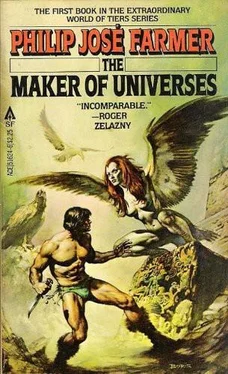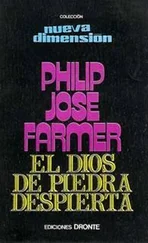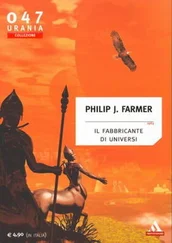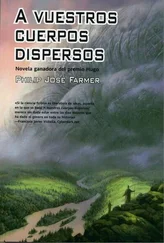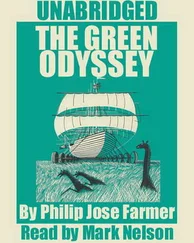At the same time, the gworl within the cornucopia slid out, sputtering. Wolff stabbed at its side; the knife slid off one of the cartilaginous bumps. The gworl screamed and turned toward him. Wolff rose and thrust with all his strength at its belly. The knife went in to the hilt. The gworl grabbed at it; Wolff stepped back; the gworl fell into the water. The cornucopia floated away, leaving Wolff exposed, the knife gone, and only the stone in his hand. The remaining gworl was advancing on him, holding its knife across its breast. Evidently it did not intend to try for a second throw. It meant to close in on Wolff.
Wolff forced himself to delay until the thing was only ten feet from him. Meanwhile, he crouched down so that the water came to his chest and hid the stone, which he had shifted from his left to his right hand. Now he could see the gworl’s face clearly. It had a very low forehead, a double ridge of bone above the eyes, thick mossy eyebrows, close-set lemon-yellow eyes, a flat, single-nostriled nose, thin black animal lips, a prognathous jaw which curved far out and gave the mouth a froglike appearance, no chin, and the sharp, widely separated teeth of a carnivore. The head, face, and body were covered with long, thick, dark fur. The neck was very thick, and the shoulders were stooped. Its wet fur stank like rotten fungus-diseased fruit.
Wolff was scared at the thing’s hideousness, but he held his ground. If he broke and ran, he would go down with a knife in his back.
When the gworl, alternately hissing and rasping in its ugly speech, had come within six feet, Wolff stood up He raised his stone, and the gworl, seeing his intention, raised his knife to throw it. The stone flew straight and thudded into a bump on the forehead. The creature staggered backward, dropped the knife, and fell on its back in the water. Wolff waded toward it, groped in the water for the stone, found it, and came up from the water in time to face the gworl. Although it had a dazed expression and its eyes were slightly crossed, it was not out of the fight. And it held another knife.
Wolff raised the stone high and brought it down on top of the skull. There was a loud crack. The gworl fell back again, disappearing in the water, and appeared several yards away floating on its face.
Reaction took him. His heart was hammering so hard he thought it would rupture, he was shaking all over, and he was sick. But he remembered the knife stuck in the mud and retrieved it.
The girl was still behind the tree. She looked too horror-struck to speak. Wolff picked up the horn, took the girls arm with one hand, and shook her roughly.
“Snap out of it! Think how lucky you are! You could be dead instead of them!”
She burst into a long wailing, then began weeping. He waited until she seemed to have no more grief in her before speaking. “I don’t even know your name.”
Her enormous eyes were reddened, and her face looked older. Even so, he thought, he had not seen an Earthwoman who could compare with her. Her beauty made the terror of the fight thin away.
“I’m Chryseis,” she said. As if she were proud of it but at the same time shy of her proudness, she said, “I’m the only woman here who is allowed that name. The Lord forbade others to take it.”
He growled, “The Lord again. Always the Lord. Who in hell is the Lord?”
“You really don’t know?” she replied as if she could not believe him.
“No, I don’t.” He was silent for a moment, then said her name as if her were tasting it. “Chryseis, heh? It’s not unknown on Earth, although I fear that the university at which I was teaching is full of illiterates who’ve never heard the name. They know that Homer composed the Iliad, and that’s about it.
“Chryseis, the daughter of Chryses, a priest of Apollo. She was captured by the Greeks during the siege of Troy and given to Agamemnon. But Agamemnon was forced to restore her to her father because of the pestilence sent by Apollo.”
Chryseis was silent for so long that Wolff became impatient. He decided that they should move away from this area, but he was not certain which direction to take or how far to go.
Chryseis, frowning, said, “That was a long time ago. I can barely remember it. It’s all so vague now.”
“What are you talking about?”
“Me. My father. Agamemnon. The war.”
“Well, what about it?” He was thinking that he would like to go to the base of the mountains. There, he could get some idea of what a climb entailed.
“I am Chryseis,” she said. “The one you were talking about. You sound as if you had just come from Earth. Oh, tell me, is it true?”
He sighed. These people did not lie, but there was nothing to keep them from believing that their stories were true. He had heard enough incredible things to know that they were not only badly misinformed but likely to reconstruct the past to suit themselves. They did so in all sincerity, of course.
“I don’t want to shatter your little dream-world,” he said, “but this Chryseis, if she even existed, died at least 3000 years ago. Moreover, she was a human being. She did not have tiger-striped hair and eyes with feline pupils.”
“Nor did I... then. It was the Lord who abducted me, brought me to this universe, and changed my body. Just as it was he who abducted the others, changed them, or else inserted their brains in bodies he created.”
She gestured seaward and upward. “He lives up there now, and we don’t see him very often. Some say that he disappeared a long time ago, and a new Lord has taken his place.”
“Let’s get away from here,” he said. “We can talk about this later.”
They had gone only a quarter of a mile when Chryseis gestured at him to hide with her behind a thick purple-branched, gold-leaved bush. He crouched by her and, parting the branches a little, saw what had disturbed her. Several yards away was a hairy-legged man with heavy ram’s horns on top of his head. Sitting on a low branch at a level with the man’s eyes was a giant raven. It was as large as a golden eagle and had a high forehead. The skull looked as if it could house a brain the size of a fox terrier’s.
Wolff was not surprised at the bulk of the raven, for he had seen some rather enormous creatures. But he was shocked to find the bird and the man carrying on a conversation.
“The Eye of the Lord,” Chryseis whispered. She stabbed a finger at the raven in answer to his puzzled look. “That’s one of the Lord’s spies. They fly over the world and see what’s going on and then carry the news back to the Lord.”
Wolff thought of Chryseis’ apparently sincere remark about the insertion of brains into bodies by the Lord. To his question, she replied, “Yes, but I do not know if he put human brains into the ravens’ heads. He may have grown small brains with the larger human brains as models, then educated the ravens. Or he could have used just part of a human brain.”
Unfortunately, though they strained their ears, they could only catch a few words here and there. Several minutes passed. The raven, loudly croaking a goodbye in distorted but understandable Greek, launched himself from the branch. He dropped heavily, but his great wings beat fast, and they carried him upward before he touched ground. In a minute he was lost behind the heavy foliage of the trees. A little later, Wolff caught a glimpse of him through a break in the vegetation. The giant black bird was gaining altitude slowly, his point of flight the mountain across the sea.
He noticed that Chryseis was trembling. He said, “What could the raven tell the Lord that would scare you so?”
“I am not frightened so much for myself as I am for you. If the Lord discovers you are here, he will want to kill you. He does not like uninvited guests in his world.”
Читать дальше
